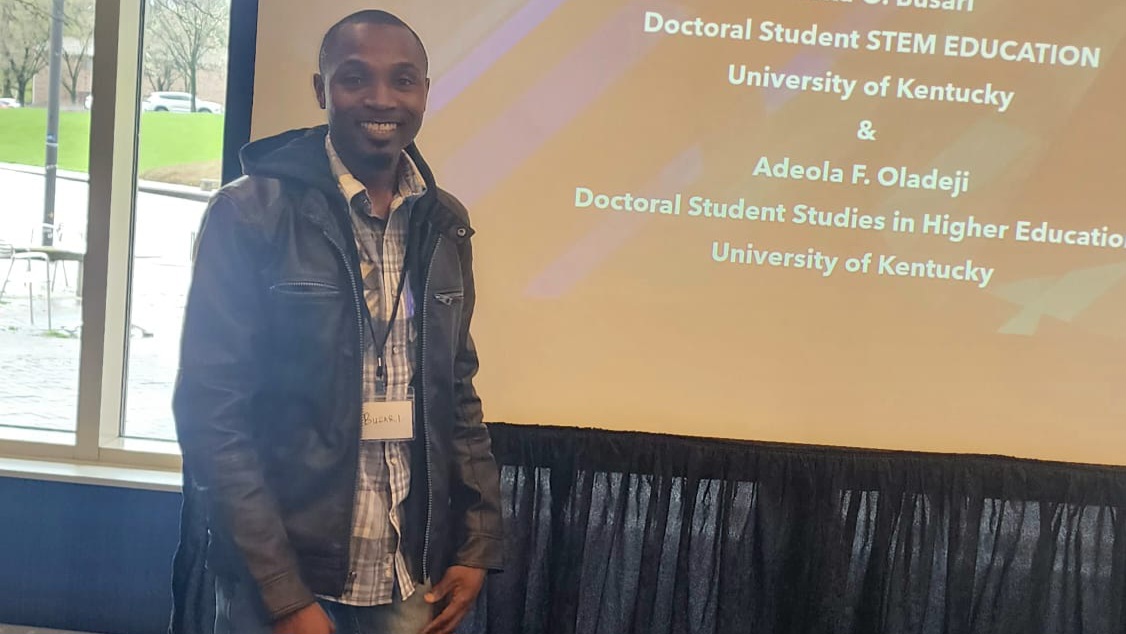 In the evolving STEM education landscape, few educators stand out as prominently as Isiaka Olayinka Busari. A dedicated researcher and teacher, Busari is currently pursuing a Ph.D. in STEM Education at the University of Kentucky, where his work is making significant strides in improving mathematics education. His dissertation, “Examining High School Mathematics Teachers’ Research-Based Instructional Practices and Their Relationship to Students’ Learning Outcomes: A Convergent Parallel Mixed-Method Study,” reflects a deep commitment to fostering better learning environments in math. This subject is critical to the future success of countless students.
In the evolving STEM education landscape, few educators stand out as prominently as Isiaka Olayinka Busari. A dedicated researcher and teacher, Busari is currently pursuing a Ph.D. in STEM Education at the University of Kentucky, where his work is making significant strides in improving mathematics education. His dissertation, “Examining High School Mathematics Teachers’ Research-Based Instructional Practices and Their Relationship to Students’ Learning Outcomes: A Convergent Parallel Mixed-Method Study,” reflects a deep commitment to fostering better learning environments in math. This subject is critical to the future success of countless students.
Busari’s journey into education began in Nigeria, where he pioneered innovative teaching methods that empowered countless students to achieve their dreams. Before relocating to the United States in 2016 to further his studies, Busari was deeply involved in developing impactful STEM education programs in Nigeria, including the STEM Club Initiative, JETS Club, and MATHLAB. These initiatives were designed to close educational gaps and promote STEM literacy among young learners, laying a solid foundation for future success in these critical fields.
Since moving to the United States, Busari has continued his mission with remarkable dedication. He has educated and tutored over 500 students, guiding them through their challenges with mathematics and inspiring their aspirations in STEM fields. His extensive experience as both an educator and researcher fuels his passion for creating more effective instructional strategies, ensuring that every student has the opportunity to excel. Busari’s unwavering commitment to STEM education has made a lasting impact in Nigeria and the United States, demonstrating his extraordinary ability to shape the future of young minds.
One of the core aspects of Busari’s work is his focus on students who struggle with mathematics—a challenge that often blocks their path to careers in STEM disciplines. This challenge has inspired him to explicitly develop and refine instructional strategies to give these students the support they need to succeed. His dissertation is central to this effort, as it examines the instructional practices of high school mathematics teachers and their impact on student learning outcomes. Through this research, Busari aims to identify strategies teachers can implement to help students overcome their difficulties in math, ensuring their academic success.
At the University of Kentucky, Busari serves as a Peer-Supported Learning and Teaching Assistant within the Transformative Learning Department, where he has been a pioneer in enhancing educational content and delivery. His innovative strategies mainly focus on meeting the needs of students from diverse backgrounds, especially those economically and educationally disadvantaged. His commitment to educational equity is evident in every aspect of his work.
Beyond focusing on instructional practices, Busari is deeply invested in understanding the relationship between teachers’ and students’ attitudes toward mathematics. He recognizes that teachers play a pivotal role in shaping their students’ perceptions and outcomes in the subject. His research underscores the importance of teacher training programs that enhance content knowledge and foster positive attitudes and effective teaching methods. These elements are crucial for creating supportive and engaging learning environments.
In addition to his work on attitudes and instructional methods, Busari strongly advocates for culturally responsive teaching practices. He emphasizes the importance of educators considering their students’ diverse backgrounds and experiences when designing lessons. By incorporating culturally relevant examples and materials, teachers can create more inclusive classrooms that resonate with all students, deepening their understanding of mathematical concepts.
Busari also strongly emphasizes the integration of technology in education. He believes that digital tools and resources can significantly enhance student engagement and allow personalized learning experiences tailored to each student’s needs, regardless of their prior knowledge or learning style.
Busari’s commitment to supporting under-prepared students is further demonstrated by the targeted interventions he has developed. These include tutoring programs, study groups, and workshops to build students’ confidence and improve their academic performance in mathematics. He aims to address these students’ unique challenges and ensure they can succeed in math and beyond.
The impact of Busari’s work extends far beyond the University of Kentucky. His research has broader implications for educational policy and practice, potentially influencing teacher training programs and educational initiatives on a national scale. Busari’s work is poised to shape the future of education by highlighting the importance of teacher attitudes and culturally responsive teaching.
Through his mentorship of graduate students and early-career teachers, Busari is cultivating a new generation of educators committed to fostering positive attitudes and creating inclusive learning environments. His contributions to the field of education have been recognized nationally and internationally, solidifying his reputation as a vital force in advancing STEM education.
In Conclusion, Isiaka Olayinka Busari’s unwavering dedication to developing innovative instructional strategies ensures that every student, regardless of background, can succeed in mathematics and beyond. His work inspires educators and students alike and drives meaningful change across the educational landscape, making him a trailblazer in STEM education.






